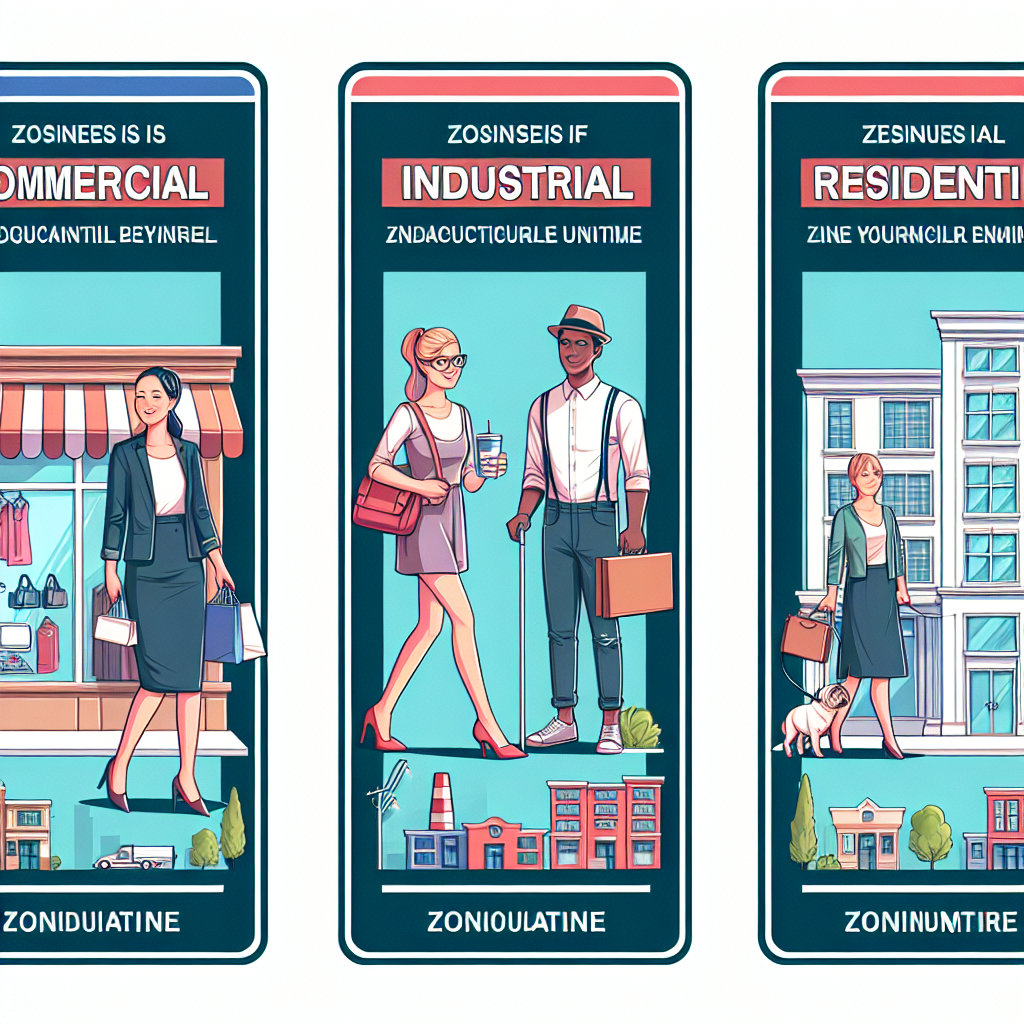So, you’re thinking about starting a business in British Columbia, eh? Well, before you dive headfirst into the entrepreneurial world, it’s crucial to understand the zoning requirements for your business location. Zoning regulations play a significant role in determining what type of commercial activities can take place in specific areas. So, whether you’re opening a cozy cafe in downtown Vancouver or a retail store in Victoria, knowing the ins and outs of zoning will ensure you’re on the right track to finding the perfect spot for your business in BC.

Understanding Zoning Requirements for your Business Location in BC
When it comes to setting up a business in British Columbia (BC), it’s important to understand the zoning requirements for your chosen location. Zoning regulations play a crucial role in determining the permissible uses of a property and ensuring compliance with local laws. By familiarizing yourself with the different types of zoning, researching local regulations, and understanding the intricacies of zoning maps, you can navigate the process smoothly and avoid potential legal issues.
Why are Zoning Requirements Important?
Ensuring Compliance with Local Laws
Zoning requirements are put in place by local governments to regulate land use and promote responsible development. These regulations help maintain the character and integrity of different areas within a jurisdiction. By following zoning requirements, you can ensure that your business operates within the boundaries set by local laws and avoid penalties and potential legal issues.
Minimizing Potential Legal Issues
Operating a business in violation of zoning regulations can have serious consequences. It may result in fines, closure orders, or even lawsuits. Understanding and adhering to the zoning requirements for your business location can help minimize the risk of legal issues, allowing you to focus on running your business without unnecessary disruptions.
Fulfilling Environmental and Community Standards
Zoning requirements often take into consideration environmental factors and community standards. By complying with these regulations, you can contribute to the overall well-being of the community and ensure that your business operates in an environmentally responsible manner. Zoning regulations may include provisions for parking, setbacks, building heights, and other elements that impact the aesthetics and livability of an area.
Different Types of Zoning
In BC, there are several types of zoning that determine what activities can take place in a particular area. It’s important to understand the different zoning designations to ensure that your business is allowed in your chosen location.
Residential Zoning
Residential zoning is typically designated for housing purposes. It restricts commercial and industrial activities to preserve the residential character of an area. If you plan to operate a business from your home, you must ensure that it complies with the residential zoning regulations and any additional restrictions that may apply.
Commercial Zoning
Commercial zoning is aimed at accommodating businesses and commercial activities. These zones allow for a wide range of businesses, such as retail stores, restaurants, offices, and service establishments. It’s important to understand the specific regulations and restrictions that apply to commercial zones, such as requirements for parking spaces or signage.
Industrial Zoning
Industrial zoning is intended for heavy industry, manufacturing, and processing facilities. These zones often have specific requirements regarding noise, emissions, and setbacks. If your business involves industrial activities, it’s essential to choose a location that is zoned appropriately and complies with all relevant regulations.
Agricultural Zoning
Agricultural zoning is designated for farming and agricultural activities. These zones protect agricultural land and promote sustainable farming practices. If your business is related to agriculture, such as a farm, nursery, or agritourism, it’s important to choose a location that is zoned for agricultural use and meets all the necessary requirements.
Mixed-Use Zoning
Mixed-use zoning combines different types of land use within a single area. These zones accommodate a mix of residential, commercial, and sometimes industrial activities. Mixed-use zones are often designed to promote walkability and create vibrant communities. If you’re looking for a location that allows for a combination of residential and business uses, exploring mixed-use zoning may be a viable option.
How to Determine Zoning Requirements
Once you have an understanding of the different types of zoning, it’s important to determine the specific zoning requirements for your intended business location in BC. Here are some steps you can take to gather the necessary information:
Researching Local Zoning Regulations
Start by researching the zoning regulations specific to the jurisdiction where your business is located. Local government websites often have resources and information related to zoning, including zoning bylaws and maps. Familiarize yourself with the regulations that apply to your type of business and ensure that your intended location is zoned appropriately.
Consulting with Zoning Departments
Contacting the local zoning department can provide valuable insights and clarification on zoning requirements. They can help you understand the specific regulations that apply to your business and answer any questions you may have. It’s important to reach out early in the process to avoid potential problems or delays down the line.
Engaging Professional Services
If you find researching and understanding zoning regulations overwhelming, consider engaging the services of professionals who specialize in land use planning or zoning consulting. These experts can guide you through the process, help you interpret zoning requirements, and ensure that your business location is in compliance with all applicable regulations.

Understanding Zoning Maps
Zoning maps are an essential tool for understanding the zoning requirements and designations for a particular location. Here’s what you need to know about interpreting zoning maps:
Interpreting Zoning Designations and Symbols
Zoning maps use different designations and symbols to represent various zoning categories. These designations indicate what types of activities are permitted in each zone. Understanding the meanings of these designations is crucial when determining if your business is allowed in a specific location.
Identifying Adjacent Zone Types
Zoning maps also provide information about adjacent zones, which can be important when evaluating a potential business location. Understanding the neighboring zones can help you assess whether there are any incompatible uses nearby or if there are opportunities for synergy.
Recognizing Zone Setbacks and Building Heights
Zoning maps often show setbacks and building height restrictions for each zone. Setbacks specify the minimum distance that a building must be set back from property lines or other designated areas. Building height restrictions dictate the maximum height that a structure can reach. Understanding these limitations is essential for planning your business location or any future expansion projects.
Permitted and Prohibited Uses
Zoning regulations specify the types of activities that are permitted or prohibited within each zone. Here’s what you need to know:
Identifying Allowed Business Types
It’s important to determine whether your business activity is allowed in the zone you are considering. Zoning regulations often have specific lists of permitted uses, known as use tables, which outline the allowable activities for each zone. Review these use tables to ensure that your business falls within the permissible uses.
Understanding Prohibited Activities and Uses
Zoning regulations not only specify permitted uses but also outline prohibited activities and uses. These limitations are put in place to protect the integrity and well-being of the community. Make sure you understand the prohibited activities that may apply to your business and ensure compliance to avoid potential legal issues.
Finding Exceptions or Variances
In some cases, zoning regulations may include provisions for exceptions or variances. These allow for certain activities or uses that would not normally be permitted in a specific zone. If your business falls into a gray area, it may be worth exploring whether there are any provisions that could allow for an exception or variance.
Zoning Restrictions and Limitations
Zoning restrictions and limitations cover a range of elements that impact building and property use. Here are some key areas to consider:
Minimum Lot Sizes
Zoning regulations often specify minimum lot sizes required for different types of developments. These regulations ensure that buildings are appropriately sized for the area and prevent overcrowding or excessive development. Make sure you understand the minimum lot size requirements for your intended business location.
Building Size and Dimensions
Zoning regulations may impose limitations on building size and dimensions, including floor area ratios, building coverage, and building setbacks. These restrictions help maintain the character and density of an area. Ensure that your business plans align with these requirements before proceeding with your chosen location.
Parking and Access Requirements
Zoning regulations typically address parking and access requirements to ensure that businesses provide adequate parking spaces and convenient access for customers, employees, and deliveries. The regulations may specify the number of parking spaces required based on the type of business and square footage. Understanding and meeting these requirements is crucial for a successful business operation.
Special Considerations for Home-Based Businesses
If you plan to operate a business from your home, there are additional zoning considerations to keep in mind:
Residential Zoning Implications
In residential zones, operating a business may be subject to additional restrictions or increased scrutiny. Home-based businesses are often subject to regulations that aim to maintain the residential character of the area and minimize the impact on neighbors. Determine whether your intended business activity is permitted in residential zones and understand any additional requirements that may apply.
Separation of Business and Living Areas
Zoning regulations often require a clear separation between the business and living areas in a home-based business. This separation helps ensure that the home remains primarily residential and prevents commercial activities from disrupting the neighborhood. Compliance with these separation requirements is crucial to operate a home-based business legally.
Permitted Business Activities
Some types of businesses may be prohibited from operating in residential zones altogether. Make sure you understand the specific regulations that apply to your intended home-based business and ensure that it falls within the permitted activities outlined in the zoning regulations.
Navigating Zoning Amendments and Exceptions
In some cases, you may need to pursue a zoning amendment or seek an exception or variance to operate your business in a specific location. Here’s what you need to know:
Understanding the Amendment Process
Zoning amendments involve changing the existing zoning designation of a property. These processes typically require submitting an application, paying fees, and engaging in a consultation process with local government officials and sometimes the community. Understanding the zoning amendment process can help you determine the feasibility and potential challenges of pursuing a change to the existing zoning.
Seeking Exemptions or Variances
If your business activity does not comply with the current zoning regulations, you may be able to seek an exemption or variance. Exemptions provide relief from certain regulations while still maintaining the existing zoning designation, whereas variances allow for deviations from specific requirements. These processes typically involve demonstrating that the proposed activity will not have a negative impact on the surrounding area.
Potential Challenges and Delays
Navigating zoning amendments, exemptions, or variances can be complex and time-consuming. It’s important to be prepared for potential challenges, including opposition from community members, requirements for additional studies or reports, and potential delays in the approval process. Engaging professionals familiar with the local zoning regulations can help navigate these challenges more effectively.
Rezoning Options and Procedures
If you determine that your business requires a different zoning designation to operate in a specific location, you may need to pursue a rezoning process. Here’s what you need to know:
Changing Zoning Designations
Rezoning involves changing the existing zoning designation to one that allows for your intended business activity. This process typically requires submitting an application, engaging in consultation with the local government and community, and paying fees. It’s important to understand the procedures and requirements specific to the jurisdiction where your business is located.
Community Consultation and Public Hearings
The rezoning process often includes community consultation and public hearings. These opportunities allow community members to express their opinions and concerns regarding the proposed rezoning. It’s important to engage in open and transparent communication with the community to address any potential issues and demonstrate the benefits of your business activity.
Approval and Implementation Steps
Once the rezoning application is approved, you can proceed with the implementation of your business plans. Ensure that you comply with any conditions or requirements set forth in the approval process. This may include submitting development permit applications, complying with architectural guidelines, or meeting other specific requirements.
Navigating the zoning requirements for your business location in BC can seem daunting at first, but by understanding the different types of zoning, researching local regulations, interpreting zoning maps, and ensuring compliance with permitted uses and restrictions, you can successfully establish your business while adhering to local laws and regulations. Remember to consult with zoning experts or professionals to ensure a smooth process and avoid any potential legal issues.

